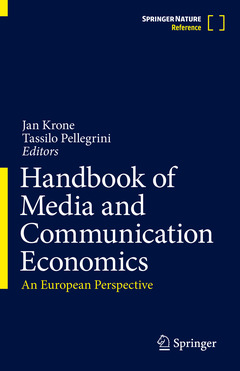Handbook of Media and Communication Economics, 1st ed. 2024 A European Perspective
Coordonnateurs : Krone Jan, Pellegrini Tassilo

- Advertising Decline as a Media-Economic Factor: From Two-Sided Markets to Datafication in Journalism
- Book/Book Groups
- Changing Use of Audiovisual Media
- Classical Political Economy
- Commercial Audience Market Research
- Controlling in media companies
- Corporate Social Responsibility in Media Companies
- Crisis Management in Media Companies
- Critical Political Economy
- Daily, Weekly, and Free Newspapers and Advertising Journals
- Databases, Data Warehousing, and Data Analytics
- Digital Rights Management. Technologies, Application Areas and Development Perspectives
- Film and Cinema in the Age of Media Convergence
- Four Zones, Four Concepts, Actors with a Past: A Special Story of the Beginning. Allied Media Regulation in Austria
- Government Subsidies to News Media. Theories and Practices
- History of Journalism
- Industrial Economics
- Institutionalist Theoretical Approaches for Media Economics
- Journalism and Advertising. On the Separation of Editorial Content and Commercial Communication
- Key Aspects of Media Production
- Lectures for Digital Residents. Preface to the Handbook of Media and Communication Economics
- Management of content in the core processes of production and distribution
- Mass Media Communication. Mass communication as an economic good
- Measurement of media concentration: Empirical concepts, applications and challenges
- Media Brand Management
- Media Business Model Management: A Synopsis
- Media Competence. Challenges in Dealing with Converging Media Offerings
- Media Concentration: Problem and Regulation
- Media Goods Between Economic and Cultural Assets
- Media Innovations and Media Revolutions. From Gutenberg to Berners Lee
- Media Meritocracy. A Question of Preferences. Interpretations of the Context of Need Decide on the Supply Policy of Mass Media
- Media planning
- Media Policy in Hybrid Media Systems
- Media regulation in Switzerland since 1945
- Media Regulation of Allied Germany
- Media Regulation of the European Union
- Media Self-Regulation
- Media Technology as an Entrepreneurial Diversification Factor
- Media use
- Methods of Media Economics
- Micromedia – Mobile Communication
- Music
- Net neutrality and digital media distribution
- News Agencies
- Non-Commercial Broadcasting
- Online Media/Net Media as Journalistic Offerings
- Periodicals/Subject Groups
- Public Broadcasting
- Public Service Broadcasting in Europe and the USA
- Public Sphere Conceptions: Public Sphere Theory
- Public Value
- Radio
- Resilience of Hyperlocal Media in a Global Media Environment
- Rights Management and Licensing
- Service Economics and Media – Media Producer and Media Consumer as Value Creation Partners A Service Theory Approach to Media
- Social Dimensions of Advertising Communication
- Social Media
- Technology and Media Acceptance. A Theoretical Modelling to Weigh User Demand for Communication Services in the Media Transition
- The History of Media Economic Thought in the German-Speaking World up to the Year 2000
- The Media and Communication Economics: Foreword by the Editors
- Value Creation System Linear Television
- Wider, Deeper, More Oblique: Diversification of Media Company.
Captures the contentious discourse and disputes for which the curriculum field is known
Provides an interdisciplinary perspective on European media business in the digital age
Presents a comprehensive overview of the European media economy
Date de parution : 06-2024
Ouvrage de 1491 p.
15.5x23.5 cm



